



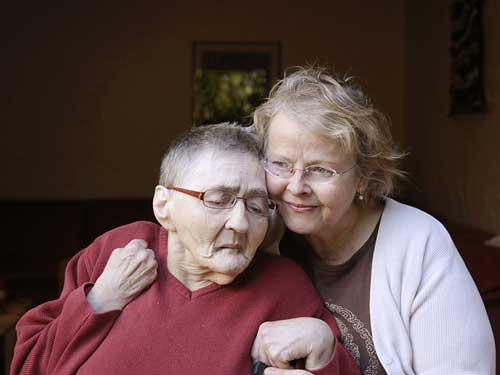
When contributing to support of rights based approaches and positive outcomes you must know:
Wrth weithio mewn cartref gofal a chyfrannu at ddulliau gweithredu seiliedig ar hawliau, mae'n rhaid i chi ddeall y canlynol:

Rights based approaches can mean many things in health and social care. When in a care home setting an older individual should expect to have the following rights:
To do this, care workers must recognise that each older person is entitled to rights and that they are all unique individuals and must be treated as so. There is a balance to be struck between supporting an older individual too much, thus taking away their rights to independence. However, by not supporting them enough it takes away their right to safety causing the standard of care being received to decline as the individual needs are not being met sufficiently.
Rights based approaches can ensure a high standard of care if followed correctly by all members of staff. It can create an environment of safety and positive relationships between staff and individuals.
Gall dulliau gweithredu seiliedig ar hawliau olygu llawer o bethau ym maes iechyd a gofal cymdeithasol. Mewn cartref gofal, dylai person hŷn ddisgwyl cael yr hawliau canlynol:
Er mwyn gwneud hyn, rhaid i weithwyr gofal gydnabod bod gan bob person hŷn hawliau a'u bod i gyd yn bobl unigryw a bod yn rhaid eu trin felly. Rhaid taro cydbwysedd rhwng rhoi gormod o gymorth i berson hŷn, gan amharu ar ei hawl i annibyniaeth. Fodd bynnag, mae peidio â rhoi digon o gymorth yn amharu ar ei hawl i ddiogelwch sy'n golygu bod safon y gofal a ddarperir yn dirywio gan nad yw anghenion yr unigolyn yn cael eu diwallu'n ddigonol.
Change last sentence to:
Gall dulliau gweithredu seiliedig ar hawliau sicrhau safon uchel o ofal os bydd pob aelod o staff yn eu dilyn yn gywir. Gallant greu amgylchedd diogel a pherthnasoedd cadarnhaol rhwng darparwyr y gwasanaeth a'r person hŷn, yn ogystal â datblygu ymddiriedaeth rhyngddynt.

Advocacy is an important aspect of support services for individuals who are unable to make decisions for themselves. This could be caused by illnesses such as dementia. Some individuals may just require more help to make informed decisions about their care and support.
An advocate can help an older individual to:
Advocates can help to ensure an individual’s voice is heard and help them get the care that they need in line with their likes and dislikes, therefore, making the care more person centred.
Advocacy comes in different forms and includes:
Self-advocacy - This is the ability to speak-up for yourself and the things that are important to you. Self-advocacy means you are able to ask for what you need and want and tell people about your thoughts and feelings.
Informal advocacy - When people like relatives and friends or other professionals speak out for an individual.
Collective advocacy - This is when a group of people who are all facing similar problems get together to work on specific issues and have their voices heard.
Peer advocacy - Is when one-to-one support is provided by advocates with similar issues to a person using services.
Citizen advocacy - This is when there is committed relationship between an individual and a suitable citizen who provides long-term advocacy to a person.
Independent volunteer advocacy - This is when someone gives their free time and volunteers to speak on behalf of others.
Formal advocacy - This is where a professional advocate supports an individual with a specific issue or concern.
Independent professional advocacy - This is when there is a one-to-one partnership between an individual and an independent professional advocate who is trained and paid to undertake the role.
Mae eiriolaeth yn agwedd bwysig ar y broses ofal i rai pobl hŷn gan fod rhai yn methu gwneud penderfyniadau drostynt eu hunain. Gall hyn ei achosi gan salwch fel dementia. Efallai y bydd rhai unigolion angen mwy o gymorth ar rai pobl i'w helpu i wneud dewisiadau gwybodus am eu gofal.
Gall eiriolwr helpu unigolyn hŷn i wneud y canlynol:
Gall eiriolwyr helpu i sicrhau bod llais unigolyn yn cael ei glywed a helpu i sicrhau ei fod yn cael y gofal sydd ei angen arno yn unol â'r hyn y mae'n ei hoffi a'r hyn nad yw'n ei hoffi ac mae hyn, felly, yn golygu bod y gofal yn canolbwyntio mwy ar y person.
Mae gwahanol fathau o eiriolaeth, gan gynnwys:
Hunaneiriolaeth – Dyma’r gallu i sefyll i fyny drosoch eich hun a'r pethau sy'n bwysig i chi. Mae hunaneiriolaeth yn golygu eich bod yn gallu gofyn am yr hyn sydd ei angen arnoch a dweud wrth bobl am eich meddyliau a'ch teimladau.
Eiriolaeth anffurfiol – Pan fydd pobl fel perthnasoedd a ffrindiau neu weithwyr broffesiynol eraill yn siarad ar ran yr unigolyn.
Cydeiriolaeth – Pan fydd grŵp o bobl sy’n wynebu problemau tebyg yn dod ynghyd i weithio ar faterion penodol a llesio eu barn.
Eiriolaeth cymheiriaid – Pan fydd cymorth un-i-un yn cael ei roi gan eiriolwyr a phroblemau tebyg i’r person sy’n defnyddio’r gwasanaethau.
Eiriolaeth dinasyddion – Pan fydd perthynas ymroddedig rhwng unigolyn a dinesydd addas sy’n rhoi cymorth eiriolaeth hirdymor i berson.
Eiriolaeth ffurfiol – Pan fydd eiriolwr proffesiynol yn helpu unigolyn gyda mater neu bryder penodol.
Eiriolaeth broffesiynol annibynnol – Pan fydd partneriaeth un-i-un rhwng unigolyn ac eiriolwr proffesiynol annibynnol sydd wedi cael ei hyfforddi ac sy’n cael ei dalu i gyflawni’r rôl.
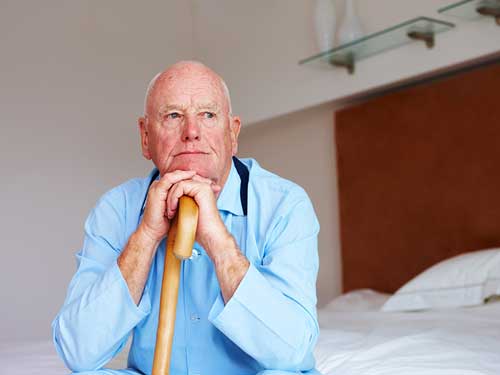
Attitudes towards older individuals can vary. With an ageing population and the need for an increased number of care home spaces, some individuals believe that older adults are a drain on society as the cost to fund care is high. This can create a negative image of older individuals, thus older individuals then holding a negative image about themselves.
There can also be stigma attached to going into a care home setting, which individuals may struggle to deal with, therefore creating a feeling of low self-esteem and worthlessness.
Negative attitudes about older individuals can have implications for an older and affect their quality of life. This may include restricting their want to access the outside world; they may feel like giving up and overwhelmed and may even become disempowered.
In the long-term an individual’s mental and physical health can even shorten life expectancy.
Gall yr agweddau tuag at unigolion hŷn amrywio. Gyda phoblogaeth sy'n heneiddio a'r angen am fwy o leoedd mewn cartrefi gofal, mae rhai pobl yn teimlo bod oedolion hŷn yn faich ar gymdeithas gan fod cost gofal yn uchel. Gall hyn greu delwedd negyddol o bobl hŷn, sy'n golygu yn ei dro bod gan bobl hŷn ddelwedd negyddol ohonynt eu hunain.
Yn ogystal, gall fod yn anodd ymdopi â'r stigma sy'n gallu bod yn gysylltiedig â symud i gartref gofal, sy'n arwain at ddiffyg hunan-barch ac ymdeimlad o fod yn ddi-werth.
Gall agweddau negyddol tuag at bobl hŷn effeithio ar berson hŷn a'i ansawdd bywyd. Efallai na fyddant yn cael cynnig cyfleoedd a gall hyn gyfyngu ar eu hawydd i ymwneud â'r byd y tu allan; gallant deimlo fel rhoi'r ffidil yn y to wrth iddynt gael eu llethu ac efallai y cânt eu dadrymuso hyd yn oed.
Yn yr hirdymor, gall iechyd corfforol a meddyliol unigolyn fyrhau disgwyliad oes unigolyn.
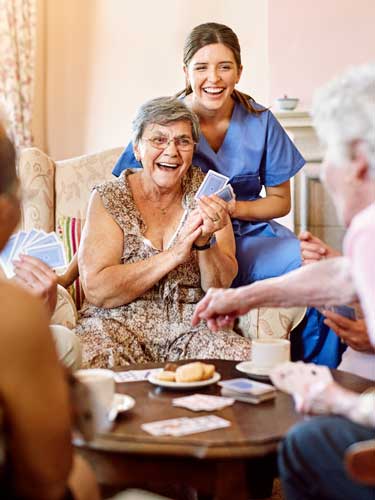
The Senses Framework is a person centred approach that aims to create the best care and support for individuals. It was developed for care homes as a set of goals that workers should aim for as follows:
A sense of security is about feeling safe and enjoying life within a safe but enabling environment. When in a safe environment, such as a care home setting, individuals are less likely to worry. Feeling safe can also help improve relationships with others and increase social interactions.
A sense of continuity is about linking the past, present and future. This can contribute to an individual’s self-identity. A strong self-identity can improve self-esteem and confidence.
A sense of belonging is about feeling part of a valued group and being able to form and maintain relationships. This is important for well-being as being part of a group and interactions with others can decrease the likelihood of loneliness, boredom and isolation.
A sense of purpose is about participating in meaningful activities and having valued goals. A sense of purpose can increase the likelihood of maintaining independence for longer and it can also help to maintain an individual’s confidence.
A sense of achievement is about reaching valued goals to the satisfaction of one's self and/or others. Reaching goals can boost self-esteem. A positive self-esteem can increase happiness.
A sense of significance is about feeling that you matter as a person and are valued. When an individual doesn’t feel significant, it may lead to destructive ways. Feeling significant gives individuals a sense of self worth and for older individuals it may spur them on to not give up.
Workers can use this framework to monitor how well they are meeting individuals’ needs.
For more information, visit the Social Care Wales website: https://socialcare.wales/
Dull gweithredu sy'n canolbwyntio ar unigolion yw'r Fframwaith Synhwyrau a'i nod yw creu'r gofal a'r cymorth gorau i unigolion. Cafodd ei ddatblygu ar gyfer cartrefi gofal fel cyfres o nodau y dylai gweithwyr anelu atynt fel a ganlyn:
Mae synnwyr diogelwch yn golygu teimlo’n ddiogel a mwynhau bywyd mewn amgylchedd diogel ond galluogol. Mae unigolion yn llai tebygol o ofidio mewn amgylchedd diogel, fel cartref gofal. Gall teimlo’n ddiogel hefyd helpu i wella perthnasoedd ag eraill ac arwain at fwy o ryngweithio cymdeithasol.
Mae synnwyr parhad yn golygu cysylltu’r gorffennol, y presennol a’r dyfodol. Gall hyn gyfrannu at hunaniaeth unigolyn. Gall hunaniaeth gref wella hunan-barch a hyder.
Mae synnwyr o ymberthyn yn golygu teimlo’n rhan o grŵp sy’n cael ei werthfawrogi a gallu ffurfio a chynnal perthnasoedd. Mae hyn yn bwysig o ran llesiant oherwydd gall bod yn rhan o grŵp a rhyngweithio ag eraill leihau’r tebygolrwydd o unigrwydd, diflastod ac ynysu.
Mae synnwyr o bwrpas yn golygu cymryd rhan mewn gweithgareddau ystyrlon a chael nodau ystyrlon. Gall synnwyr o bwrpas gynyddu’r tebygolrwydd y bydd unigolyn yn cadw ei annibyniaeth am gyfnod hwy a gall hefyd helpu i gynnal hyder unigolyn.
Mae synnwyr cyflawniad yn golygu cyflawni nodau er boddhad i chi a/neu eraill. Gall cyflawni nodau roi hwb i hunan-barch. Gall hunan-barch cadarnhaol arwain at fwy o hapusrwydd.
Mae synnwyr arwyddocâd yn golygu teimlo eich bod yn bwysig fel person a’ch bod yn cael eich gwerthfawrogi. Pan na fydd unigolyn yn teimlo ei fod yn bwysig, gall arwain at ymddygiad dinistriol. Mae teimlo’n bwysig yn rhoi synnwyr o hunan-werth i unigolion a gall ysgogi unigolion hŷn i beidio â rhoi’r ffidl yn y to.
Gall gweithwyr ddefnyddio’r fframwaith hwn i fonitro pa mor dda maent yn diwallu anghenion unigolion.
Am fwy o wybodaeth, ewch i wefan Gofal Cymdeithasol Cymru: https://gofalcymdeithasol.cymru/
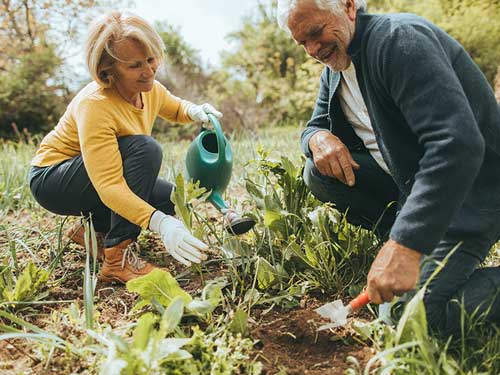
Older individuals will have had many roles in society, some of which they will continue to hold. This may include roles within the family such as husband, wife, son, daughter etc. Many older individuals are at the core of family life and are deemed as the matriarch or patriarch that hold the family together.
There is also likely to be roles within the work place, such as professional roles including doctors, lawyers and skilled roles such as plumbers and builders. Older individuals have a wealth of skills and experiences, they have lived through situations the younger generation may not even be able to imagine. This make them a valuable asset to society in many ways as with experience, comes knowledge.
Continuing with various roles can help individuals to feel part of the community, despite their required need for extra care. Enabling individuals to continue their roles can help to maintain their self-esteem and confidence and it also gives them a sense of importance and a feeling of belonging; there are also many other benefits such as, increased opportunities for social interactions, which can alleviate boredom and loneliness.
Taking these roles away or not recognising these roles could have a detrimental effect on their overall well-being, which could lead to feelings of depression and worthlessness.
Bydd unigolion hŷn wedi chwarae sawl rôl mewn cymdeithas a byddant yn parhau i chwarae rhai o'r rolau hynny. Gall hyn gynnwys rolau o fewn y teulu fel gŵr, gwraig, mab, merch ac ati. Mae llawer o bobl hŷn yn ganolog i fywyd y teulu ac yn cael eu hystyried fel y glud sy'n dal y teulu ynghyd.
Mae'n debygol hefyd fod rolau yn y gweithle, gan gynnwys rolau proffesiynol fel meddygon, cyfreithwyr a rolau medrus fel plymwyr ac adeiladwyr. Mae gan bobl hŷn gyfoeth o sgiliau a phrofiadau, maent wedi byw drwy sefyllfaoedd na all y genhedlaeth iau eu dychmygu hyd yn oed. Mae hyn yn golygu eu bod yn ased gwerthfawr i gymdeithas mewn sawl ffordd oherwydd gyda phrofiad, daw gwybodaeth.
Gall parhau â rolau amrywiol helpu unigolion i deimlo'n rhan o'r gymuned, er bod angen gofal ychwanegol arnynt. Mae galluogi unigolion i barhau â'u rolau yn eu helpu i gadw eu hunan-barch a'u hyder ac mae hefyd yn rhoi ymdeimlad o bwysigrwydd a pherthyn iddynt; mae manteision eraill hefyd fel mwy o gyfleoedd i ryngweithio'n gymdeithasol, sy'n gallu lleddfu diflastod ac unigrwydd.
Gallai atal y rolau hyn neu beidio â'u cydnabod gael effaith wael ar eu llesiant yn gyffredinol a allai, yn ei dro, wneud iddynt deimlo'n isel ac yn ddi-werth.

The fact that people are living longer should be celebrated, rather than it being seen as a burden. Older individuals can help to enrich the lives of those younger than themselves as they have a lifetime of experience and a wealth of knowledge that they can share.
Individuals still contribute within the community that they live. They may volunteer and help to support charities as well as participating in volunteering activities that help to improve the well-being of others, such as knitting and reading groups and patient driving groups etc.
They may also volunteer within the care home community itself by helping to complete chores within the setting, which can include helping to cook, clean and carry out gardening.
This can help to ease the transition from moving from their own home to living within a care home setting and it can also help to create a more realistic ‘home’ environment.
Allowing individuals to contribute can help to maintain their independence for longer and may also contribute to physical fitness and mental stimulation, depending on the task.
Those that are more able, may be able to support those that are less able by making them cups of tea or coffee, or going to the shops for them for example. This can help them to feel a sense of worth and value.
Acknowledging older individuals as valued people and seeing their contributions as such, would help to make society much more inclusive.
Dylai'r ffaith bod unigolion yn byw'n hirach gael ei dathlu, yn hytrach na'i hystyried yn faich. Gall unigolion hŷn helpu i gyfoethogi bywydau unigolion sy'n iau na nhw am fod ganddynt oes o brofiad a chyfoeth o wybodaeth y gallant ei rhannu.
Gall unigolion barhau i gyfrannu yn y gymuned lle maent yn byw. Gallant wirfoddoli a chefnogi elusennau yn ogystal â chymryd rhan mewn gweithgareddau gwirfoddoli sy'n helpu i wella llesiant unigolion eraill, fel grwpiau gwau a darllen a grwpiau gyrru cleifion ac ati.
Gallant hefyd wirfoddoli yn y cartref gofal ei hun drwy helpu i gwblhau tasgau yn y lleoliad, gan gynnwys helpu i goginio, glanhau a garddio.
Gall hyn hwyluso'r broses o symud o'u cartref eu hunain i gartref gofal a gall helpu i greu amgylchedd 'cartrefol' mwy realistig hefyd.
Gall gadael i unigolion gyfrannu eu helpu i aros yn annibynnol am fwy o amser a gall hefyd gyfrannu at ffitrwydd corfforol ac ysgogiad meddyliol, yn dibynnu ar y dasg.
Efallai y gall y rhai mwy abl helpu'r rhai sy'n llai abl drwy wneud paneidiau iddynt, neu fynd i'r siop ar eu rhan, er enghraifft. Gall hyn roi ymdeimlad o werth a phwrpas iddynt.
Byddai cydnabod unigolion hŷn fel unigolion gwerthfawr sy'n gwneud cyfraniad gwerthfawr yn helpu i wneud cymdeithas yn fwy cynhwysol.
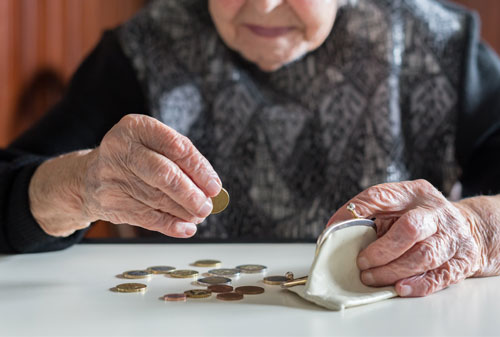
The right to a full and valued life is what all individuals in care home settings should be receiving, this includes:
Dylai fod gan bawb sy'n byw mewn cartrefi gofal yr hawl i fywyd llawn a gwerthfawr, mae hyn yn cynnwys:
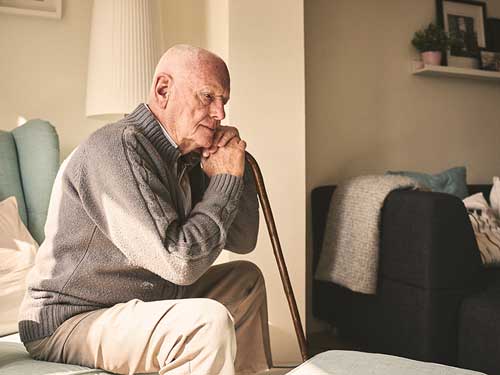
There are many possible negative effects of isolation and loneliness on individuals. Individuals who feel lonely and isolated are more likely to also report having poor physical and/or mental health.
Illnesses and conditions such as chronic lung disease, arthritis, impaired mobility, high blood pressure and depression are associated with social isolation.
In terms of mental health, individuals who are lonely are more likely to suffer from depression and other mental health issues. Feelings of loneliness are linked to poor cognitive performance, quicker cognitive decline and the increased risk of dementia.
Older individuals who are lonely and isolated are also more likely to be open to abuse and suffer from abuse. On account of their situation, this could go unnoticed and the individual may not be in a position to have anyone to tell about the abuse.
Gall ynysu ac unigrwydd gael llawer o effeithiau negyddol ar bobl. Mae unigolion sy'n teimlo'n ynysig ac yn unig yn fwy tebygol o ddweud bod ganddynt iechyd corfforol a/neu feddyliol gwael hefyd.
Mae salwch a chyflyrau fel clefyd cronig yr ysgyfaint, arthritis, namau symudedd, pwysedd gwaed uchel ac iselder yn gysylltiedig ag ynysu cymdeithasol.
O ran iechyd meddwl, mae unigolion sy'n unig yn fwy tebygol o ddioddef o iselder a phroblemau iechyd meddwl eraill. Mae teimladau o unigrwydd yn gysylltiedig â pherfformiad gwybyddol gwael, dirywiad gwybyddol cyflymach a risg uwch o ddementia.
Mae unigolion hŷn sy'n teimlo'n unig ac yn ynysig hefyd yn fwy tebygol o fod yn agored i gamdriniaeth ac, felly, yn fwy tebygol o gael eu cam-drin gan ei fod yn fwy tebygol o osgoi sylw ac maent yn llai tebygol o ddweud wrth unrhyw un amdano.

The consequences of lack of movement or stimulation can be great for older individuals. Consequences for individuals if they are left for long periods without stimulation could cause the following physical issues:
When individuals are not mentally stimulated, their mental capacity and intellectual abilities start to slow down. This damage can sometimes be irreversible.
These are the range of psychological issues that individuals who lack stimulation may experience:
Gall canlyniadau diffyg symud neu ysgogiad fod yn ddifrifol iawn i bobl hŷn. Os caiff unigolion eu gadael am gyfnodau hir heb unrhyw ysgogiad, gallai hyn achosi'r problemau corfforol canlynol:
Os na chaiff unigolion eu hysgogi'n feddyliol, mae eu galluedd meddyliol a'u galluoedd deallusol yn dechrau arafu. Weithiau, ni ellir gwneud dim i drin y niwed hwn.
Dyma'r amrywiaeth o broblemau seicolegol y gall unigolion eu hwynebu os nad ydynt yn cael digon o ysgogiad:
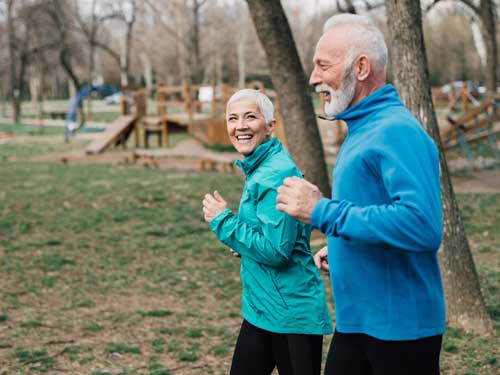
Taking risks is a part of life for most individuals and that some individuals may experience on a daily basis. Risks can take individuals out of their comfort zones and can actually be quite rewarding experiences, if the risk pays off.
Even if an older person is in a care home setting, they should still be given the option to live their life in a way that they choose, and this should include taking risks.
Risks would have to be balanced against the potential outcomes, for example, if the individual was likely to be placing themselves in danger or someone else in danger then their right to take the risk, may be taken away.
Risks may also be discouraged due to the individuals’ mental capacity. If the individual isn’t deemed to have the mental capacity to make informed decisions for themselves then certain risks may be discouraged.
Being able to choose whether you take a risk or not can be empowering and can help to give older individuals a say over what happens in their lives. To restrict an older persons ability to take risks has the potential to disempower them and reduce their ability to have control over their own lives. This may lead to feelings of low self-esteem and a poor sense of self-worth.
Mae cymryd risgiau yn rhan o fywyd y rhan fwyaf o unigolion ac mae rhai unigolion yn gwneud hynny bob dydd. Gall risgiau wneud i bobl adael yr hyn sy'n gyfforddus iddynt a gall fod yn brofiad gwerthfawr, os bydd y risg yn talu ar ei chanfed.
Hyd yn oed os bydd person hŷn mewn cartref gofal, dylai gael byw ei fywyd fel y mynno o hyd, gan gynnwys cymryd risgiau.
Byddai'n rhaid pwyso a mesur y risgiau yn erbyn y canlyniadau posibl, er enghraifft, pe bai unigolyn yn debygol o roi ei hun neu rywun arall mewn perygl, yna gallai ei hawl i gymryd risg gael ei hatal.
Mae'n bosibl na chaiff risgiau eu cymell chwaith o ganlyniad i alluedd meddyliol unigolion. Os na chredir bod gan unigolyn y galluedd meddyliol i wneud penderfyniadau gwybodus drosto ei hun, yna efallai na chaiff ei annog i gymryd risgiau penodol.
Gall dewis p'un a ddylid cymryd risg ai peidio fod yn brofiad grymusol a gall helpu i roi llais i bobl hŷn dros yr hyn sy'n digwydd iddynt. Os cyfyngir ar allu person hŷn i gymryd risgiau, gallai hyn ei ddadrymuso a lleihau ei allu i reoli ei fywyd ei hun. Gall hyn arwain at ddiffyg hunan-barch a hunan-werth.
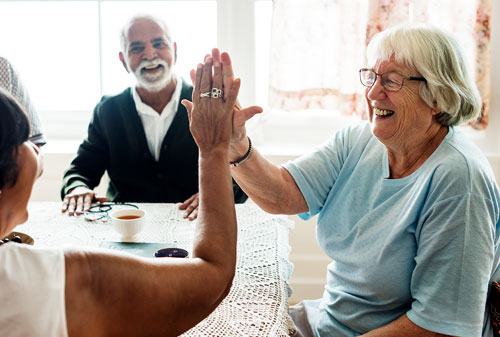
When working with older individuals there are some important things to consider when trying to find out about their history, build a relationship with them and help them to develop a sense of well-being.
When caring for individuals, the type of relationships you have with those you are caring for can play a huge role in their mental well-being as individuals are naturally sociable creatures. When we have positive relationships with others, everything we do will be more enjoyable.
Setting aside time every day to talk to individuals and taking the time to talk to them about their likes and dislikes etc., can help to get to know them and this in turn can help to create trust. Trust is central to building a positive relationship with someone. If an older individual trusts the people that support them, they are more likely to share information about their history etc.
Respect is also key to forming relationships. If you show respect towards someone, they are more likely to show respect back.
Valuing difference and celebrating diversity can help to build relationships. For example, being aware of an individuals’ preferred name or being aware of an individuals’ religious and cultural needs can help to build a relationship as it’s a part of getting to know them. This can all create a sense of belonging.
Wrth weithio gyda unigolion hŷn, mae rhai pethau pwysig i'w hystyried wrth geisio dysgu am eu hanes, meithrin perthynas â nhw a'u helpu i ddatblygu ymdeimlad o lesiant.
Wrth ofalu am unigolion, mae'r math o berthynas sydd gennych â'r rhai rydych yn gofalu amdanynt yn gallu bod yn bwysig i'w llesiant meddwl gan fod unigolion yn greaduriaid cymdeithasol yn ôl eu greddf. Pan fydd gennym berthnasoedd cadarnhaol ag eraill, bydd popeth arall a wneir yn fwy pleserus.
Drwy glustnodi amser bob dydd i siarad â phobl a chymryd amser i sgwrsio am y pethau y maent yn eu hoffi a'r pethau nad ydynt yn eu hoffi, gellir dod i adnabod unigolion a gall hyn, yn ei dro, helpu i feithrin ymddiriedaeth. Mae ymddiriedaeth yn hollbwysig er mwyn meithrin perthynas gadarnhaol â rhywun. Os bydd person hŷn yn ymddiried yn y bobl sy’n gofalu amdanynt, mae'n fwy tebygol o rannu gwybodaeth am ei hanes ac ati.
Mae parch yn bwysig hefyd er mwyn meithrin perthnasoedd. Os byddwch yn dangos parch at rywun, maent yn fwy tebygol o ddangos parch atoch chi.
Gall gwerthfawrogi gwahaniaeth a dathlu amrywiaeth helpu i feithrin perthnasoedd. Er enghraifft, gall gwybod enw dewisol unigolyn neu anghenion crefyddol a diwylliannol unigolyn helpu i feithrin perthynas gan fod hyn yn golygu eich bod yn dod i'w adnabod. Gall hyn oll greu ymdeimlad o berthyn.
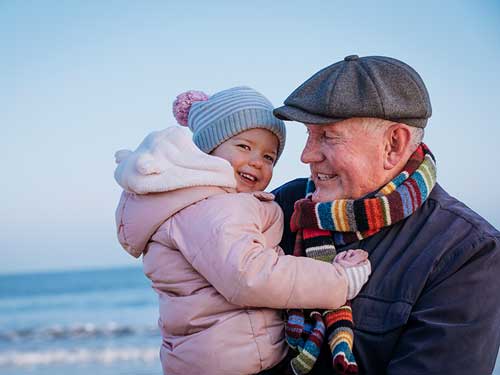
As individuals age, their opportunity to meet new people decreases so it is important that existing relationships are maintained.
Supporting older individuals to maintain positive relationships with other residents, family and friends, communities and care workers is important for good health.
Social relationships as a whole are important for successful ageing, the more varied a person’s social network of positive relationships are, the happier they are likely to be.
Family and friends can help to decrease stress and help individuals to feel like they have a place in the world. Family and friends can also provide a platform of support for an older individual and create social interactions. This can help to alleviate boredom and isolation.
Maintaining links within the community can help many older individuals to continue with activities that they once did such as going to church or attending some form of club, such as a book club. This can help to create a sense of purpose and freedom.
For some individuals, who may not have family or friends, developing relationships with workers and other residents may be central to not feeling isolated.
Providing activities within the setting can help to encourage social interaction and support relationship between residents.
Wrth i bobl heneiddio, mae'r cyfle i gyfarfod â phobl newydd yn lleihau, felly mae'n bwysig eu bod yn cadw'r perthnasoedd sydd ganddynt yn barod.
Mae helpu unigolion hŷn i gadw perthnasoedd cadarnhaol â phreswylwyr eraill, teulu a ffrindiau, cymunedau a gweithwyr gofal yn bwysig i'w hiechyd.
Mae perthnasoedd cymdeithasol yn gyffredinol yn bwysig er mwyn heneiddio'n llwyddiannus. Os bydd gan berson rwydwaith cymdeithasol amrywiol o berthnasoedd cadarnhaol, mae'n debygol o deimlo'n hapusach.
Gall teulu a ffrindiau helpu i leihau straen a helpu unigolion i deimlo bod ganddynt le yn y byd. Gall teulu a ffrindiau hefyd fod yn ffynhonnell o gymorth i bobl hŷn a chreu cyfleoedd i ryngweithio'n gymdeithasol. Gall hyn helpu i leddfu diflastod ac unigrwydd.
Gall cadw cysylltiadau yn y gymuned helpu llawer o bobl hŷn i barhau â gweithgareddau yr oeddent yn arfer eu gwneud, fel mynd i'r eglwys neu fynd i ryw fath o glwb, fel clwb llyfrau. Gall hyn helpu i greu ymdeimlad o bwrpas a rhyddid.
I rai unigolion sydd heb deulu na ffrindiau, gall datblygu perthnasoedd â gweithwyr a phreswylwyr eraill fod yn hollbwysig er mwyn eu hatal rhag teimlo'n ynysig.
Gall cynnig gweithgareddau yn y lleoliad helpu i annog preswylwyr i ryngweithio'n gymdeithasol a meithrin perthnasoedd.

Personal appearance is still very important and forms a critical part of self-identity for older individuals.
It is an individual’s way of showing their personality to others around them. An individual who has worn conservative clothing all their life would not feel comfortable if they were made to wear bright clothing once they were in a care home. It is vitally important that their own preferences are respected.
Having a clean and respectable appearance is key to maintaining the self-esteem of older individuals, and so supporting them in maintaining their personal hygiene should be a high priority. Their self-identity will be negatively affected if they are made to wear dirty clothes or are unable to wash for a particular length of time.
When an individual is supported in a care home it is necessary to take all of these factors into account when providing support with personal care. Above all, their choice of dress, hairstyle and bathing routines need to be respected.
I bobl hŷn, mae ymddangosiad personol yn bwysig iawn o hyd ac yn rhan o'u hunaniaeth.
Dyma ffordd yr unigolyn o ddangos eu personoliaeth i eraill. Ni fyddai unigolyn sydd wedi gwisgo dillad ceidwadol drwy gydol eu hoes yn teimlo'n gyfforddus pe baent yn gorfod gwisgo dillad llachar unwaith y byddant mewn cartref gofal. Mae'n hanfodol bwysig bod eu dewisiadau eu hunain yn cael eu parchu.
Mae ymddangos yn lân a pharchus yn allweddol i gynnal hunan-barch unigolion hŷn, ac felly dylai eu cefnogi i gynnal eu hylendid personol fod yn flaenoriaeth uchel. Mi fydd effaith negyddol ar eu hunaniaeth os byddant yn cael eu gorfodi i wisgo dillad budr neu os na allant ymolchi am gyfnod penodol.
Pan fydd unigolyn yn cael ei gefnogi mewn cartref gofal mae angen ystyried yr holl ffactorau hyn wrth ddarparu cymorth gyda gofal personol. Mae angen parchu eu dewis o wisg, steil gwallt ac arferion ymdrochi.
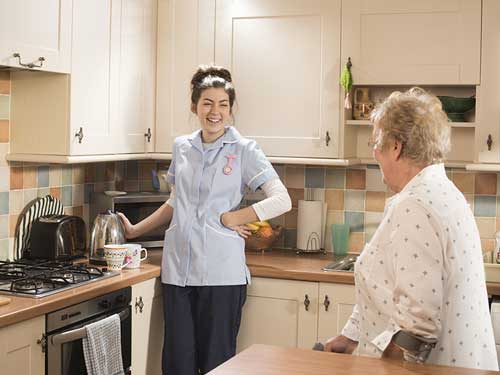
The care home environment can support positive outcomes for individuals. It is important for care home settings to create a safe and supportive environment where individuals can live comfortably, maintain their independence and not feel restricted in any way. Having a home like feel also gives a sense of community amongst residents which is integral to improving quality of care, and quality of life.
Many individuals in care home settings have conditions such as dementia, having suffered from a stroke, sensory loss, continence issues and require a varying level of support.
Care homes are adapted in order to meet the needs of their residents. For example, specialist adaptations for individuals that have had strokes can help to support their independence and allow them to bath or shower on their own, which is something they would have been unlikely to do whilst at home.
Bedrooms that are seen as ‘personal space’ can create more home like feeling and allow for privacy. This gives individuals time to clear their thoughts and have time away from others, if needed.
Individuals with dementia can become confused quite easily in their environment. Care home settings make everything more easily recognisable to ease confusion and to help individuals with dementia to find their way around.
Many care home setting have gardens. Access to outside space is also important as it provides the opportunity for exercise, fresh air, relieves tension and anxiety and offers personal space for reflection and privacy. Spending time outside in a garden has been shown to positively affect a person’s emotions and to improve their sense of well-being.
Gall amgylchedd y cartref gofal gynnig canlyniadau cadarnhaol i unigolion. Mae'n bwysig i leoliadau cartrefi gofal greu amgylchedd diogel a chefnogol lle gall unigolion fyw'n gyfforddus, cadw eu hannibyniaeth a pheidio â theimlo eu bod wedi'u cyfyngu mewn unrhyw ffordd. Mae byw mewn lle cartrefol yn rhoi ymdeimlad o gymuned ymhlith trigolion. Mae hyn yn rhan annatod o wella ansawdd gofal, ac ansawdd bywyd
Mae gan lawer o unigolion mewn cartrefi gofal gyflyrau iechyd. Gall rhain gynnwys dementia, strôc, nam synhwyrau, problemau ymataliaeth gyda lefelau’r gefnogaeth yn amrywio.
Mae cartrefi gofal yn cael ei haddasu er mwyn cwrdd ag anghenion y preswylwyr. Er enghraifft, gall addasiadau arbenigol ar gyfer unigolion sydd wedi cael strôc gynnal eu hannibyniaeth a’u galluogi i gael bath neu gawod ar eu pennau eu hunain. Byddai’n annhebygol iddynt allu gwneud hyn gartref.
Caiff ystafelloedd gwely sy’n cael eu gweld fel ‘gofod personol’ greu teimlad mwy cartrefol a chaniatáu preifatrwydd. Mae’n rhoi cyfle i’r unigolion ddelio gyda’u meddyliau, a chael amser ar eu pennau eu hunain os bydd angen.
Mae unigolion gyda dementia yn tueddu i fod yn fwy dryslyd yn eu hamgylchedd. Gall cartrefi gofal wneud popeth yn haws i’w adnabod er mwyn lleddfu’r dryswch a helpu’r unigolion sydd gyda dementia i nabod yr amgylchedd yn well.
Mae gan lawer o gartrefi gofal erddi. Mae mynediad i’r awyr agored hefyd yn bwysig gan iddo roi cyfle i’r unigolion gael ychydig o ymarfer corff, awyr iach, rhyddhau tensiwn a gorbryder ac yn cynnig gofod personol i adlewyrchu a chael preifatrwydd. Mae treulio amser tu allan mewn gardd wedi profi i gael effaith gadarnhaol ar emosiynau unigolion, yn ogystal â gwella ei llesiant.